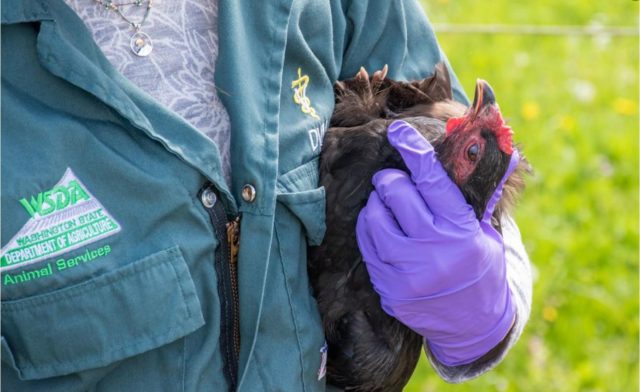
By Pepper Fisher
CLALLAM COUNTY – The Washington State Dept. of Agriculture announced Thursday that the statewide bird flu epidemic has hit Clallam County.
In an infestation that began in eastern Washington just a week ago, two flocks with avian influenza in our county have been detected, for a total of 6 statewide as of Thursday afternoon.
The new cases come from non-commercial backyard flocks and were confirmed Wednesday. The flock owners called the sick bird hotline when multiple birds died or came down with the sickness.
Neither flock is related, one had a dozen geese and the other had 10 chickens. Those still alive will be euthanized.
State veterinarian Dr. Amber Itle is urging anyone with a flock to be hyper-vigilant.
“If you have just one sick bird or you wake up tomorrow morning and one bird’s dead, we probably wouldn’t be alarmed. But if you have several birds in your flock that are sick or dead, we definitely would encourage you to call us so we can help talk that through with you and make a decision about whether you need to see your private veterinarian or whether it’s something that one of our field veterinarian’s can follow up with you. If you find a bald eagle that’s dead, or a wild bird that’s dead, or a wild goose that’s dead, any kind of wild bird mortality we would encourage you to get on the Washington State Department of Fish and Wildlife’s website where they have a reporting tool.”
Click here to get to that web page. The hotline you can call is 1-800-606-3056.
Dr. Itle says one step flock owners should continue to take is preventing contact between their flocks and wild birds by eliminating access to ponds or standing water on your property and keeping different domestic species like ducks and geese penned separately from chickens, turkeys, guinea fowl, and peacocks.
“In fact, in one of our more recent detections, we had a history of domestic water fowl, or domestic geese, sharing a pond with wild waterfowl, and that’s a problem. Because, as these birds come in and migrate through their depositing virus through fecal contamination. And once we have fecal contamination in the environment, the risk for those waterfowl is very high.”
Dr. Itle also says, until further notice, flock owners should limit access to their farms, not lend or share farm tools or equipment, and not share or sell eggs.
“One of the more recent issues that have come up for us, that we’re very concerned about, is people who give out, giveaway, eggs. So, if you have eggs, or you have extra eggs and you give them away to your neighbors or friends, or maybe you throw a sign up at the end of the lane and say, ‘extra eggs for sale’, we would encourage you, for the next few weeks, to stop doing that. Because the risk of not transmitting it in the egg, but on the egg, or on the container, is very high.”
